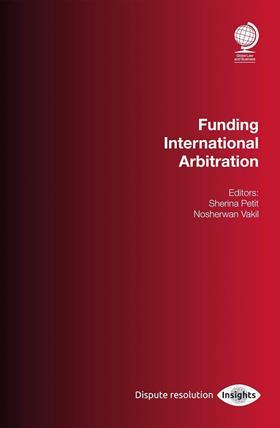Funding International Arbitration
Edited by Sherina Petit and Nosherwan Vakil
£125, Globe Law and Business
★★★✩✩
This book is intended to ‘demystify’ the funding of international arbitration. It contains practical guidance from specialist practitioners and funders. The authors provide an insight into funding options, market regulations, legal barriers to funding, disclosure of information, costs management, the role of funders, enforcement mechanisms and dispute avoidance strategies. This is an extremely practical and accessible introduction for newcomers to this specialised area of the law.
I should, however, point out that the book – 127 pages in length (ignoring the contributors’ extensive biographies) – seems to me to be rather expensive (£125). In appearance, it is an expanded A4 pamphlet. No doubt it will be argued that, as the funding of international arbitration frequently involves arbitrating disputes where hundreds of millions of pounds are at stake, the high cost of this publication is therefore justified. I disagree. The publication’s cost may dissuade some from investing in this guide.
Practitioners will no doubt recall the old rules of maintenance and champerty which made it a criminal offence or a civil tort to take over or fund another party’s litigation. It was deemed necessary to prevent such funding because the funder would often use the financial help provided for its own interests. In order to grant greater access to justice the rules have changed, and many common law jurisdictions have introduced reforms that permit third-party funding. In England and Wales maintenance and champerty have not constituted criminal offences or civil torts since the introduction of the Criminal Law Act 1967. Third-party funding in arbitration (unlike in litigation) remains effectively unregulated in England and Wales.

Lord Neuberger, former president of the UK Supreme Court, stated that third-party funding is the ‘life-blood of the justice system’. The book goes on to describe the various types of litigation funding options that are available, including before-the-event insurance, after-the-event insurance, contingency fee insurance, litigation containment insurance and several other schemes.
As this reviewer pointed out in a Gazette review of the book On Arbitration (tinyurl.com/3eh4dm97), no thought was given at the time the ICSID Convention was drafted to the issue of compliance, with enforcement of awards rendered against states in the context of international investment arbitration. It was thought that enforcement issues against states were ‘unlikely to arise’ given states’ obligations under the ICSID Convention and their reputational motivations. As this book confirms, sadly it is more or less standard for many states to evade compliance with arbitration awards. States frequently rely on sovereign immunity (a legal doctrine that grants sovereigns and states immunity from civil suits). Sovereign immunity is deployed to assert that tribunals and courts do not have jurisdiction over states, thus potentially preventing the enforcement of an award against state assets at home or abroad. In investment treaty arbitration, the issue is usually whether the asset in question is owned by the state or a state-owned entity, and whether the asset is being used for commercial or sovereign purposes. As a result, the burden falls on claimants to distinguish between the acts of the sovereign and those of a purely commercial nature. States must, of course, pay their debts including honouring adverse arbitration awards. Enforcement efforts can often be political (as was the case in a large claim your reviewer pursued on behalf of a client against the government of Ethiopia), and in the event of the sovereign’s inability or unwillingness to pay awards there are no rules and there is no centralised authority governing sovereign bankruptcy. Thus, funding for asset recovery and award enforcement becomes critically important for most claimants. In commercial arbitration where the losing party is not a sovereign state then, of course, normal enforcement mechanisms will be triggered.
Litigation funding has raised some interesting conundrums, including questions as to whether the successful party can claim from the losing party costs incurred by obtaining litigation funding (usually in the form of a success fee). In Essar Oilfield Services Ltd v Norscot Rig Management Pvt Ltd [2016] EWHC 2361 the arbitrator stated: ‘The magnitude of the arbitration resulted in a substantial amount for the claimant’s costs in the region of $3 million. Essar was undoubtedly aware that Norscot’s costs could not be financed from its own resources… and it was forced into litigation funding…It was blindingly obvious to Essar that the claimant was at a distinct financial disadvantage... and would find it difficult, if not impossible, to pursue its claims by relying on its own resources. The respondent probably hoped that the financial imbalance would force the claimant to abandon its claims.’
Essar challenged the arbitrator’s costs order regarding Essar’s liability to pay the funder’s success fee during proceedings before Judge Waksman QC in the English High Court – which had supervisory jurisdiction over the London-seated arbitration. The learned judge upheld the decision of the arbitrator.
To summarise, this is a user-friendly (but expensive, at about £1 per page) guide to a complex and tricky area of law.
Stephen D Sutton is principal of Suttons Solicitors and International Lawyers, London W1































No comments yet